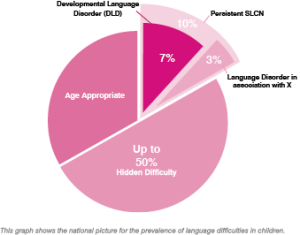Why are Speech, Language and Communication skills important?
Speech, language and communication skills are so fundamental to a child’s development, success and well-being that the United Nations now regards the ability to communicate as a human right.
We might assume that children will arrive at school with fully developed language and communication skills, but this is not a realistic expectation, even for children with no SLCN. The truth is that speech, language and communication skills all continue to develop for years after children start school. Then there are the children who are not developing as expected… approximately 10% of children will have persistent SLCN, and as many as 50% of children in socially deprived areas start school with poor language skills. This means that in your class of 30 there are likely to be at least 2 children who will have persistent difficulties with language, and there might be another 15 with unidentified needs!

This graph shows the national picture for the prevalence of language difficulties in children.
Let’s take a look at some of the potential consequences of SLCN…
For learning…
Language skills underpin learning. We use language to be able to transmit information to one-another and to scaffold and extend children’s understanding and thinking skills. In fact, spoken language is the means by which most teaching and learning takes place in primary school. Children who have difficulty with listening, understanding language and talking are at a clear disadvantage and are at significant risk for underachievement. Children may have difficulties:
- following instructions
- learning new words
- understanding concepts
- explaining their ideas and telling stories
- processing information
- making predictions and drawing inferences
These difficulties affect children’s learning across the curriculum.
“Just 15% of pupils with identified SLCN achieved the expected standard in reading, writing and mathematics at the end of their primary school years compared with 61% of all pupils.”
(Bercow 10 years on, p7 – 10: Department for Education Key Stage 2 SATS results 2017)
For literacy skills…
SLCN is linked to difficulties developing reading, writing and spelling. Children with speech sound difficulties might have trouble acquiring phonics and decoding skills. Children who have language difficulties may struggle with understanding words, recalling the right words for their purpose, understanding the grammar used to structure ideas, or constructing their own sentences. Difficulties with higher-level language and verbal reasoning skills can impair comprehension of texts. As children progress through their education, reading becomes a vehicle for learning and also supports ongoing language development, so children who have SLCN and literacy impairments are twice as disadvantaged.
“Without the right help, between 50% and 90% of children with persistent communication needs go on to have reading difficulties.” – (All Together Now – The Communication Trust)
For behaviour…
Communication difficulties contribute to behaviour problems for some children. SLCN present a barrier to being effectively able to communicate thoughts, feelings and desires – and that’s really frustrating! Remember that all behaviour is a means of communication.
“Three-quarters of young people in the UK youth offending system have below average communication skills, and just under a third have diagnosed speech, language, and communication needs (SLCN).” – (Language as a Child Wellbeing Indicator – Early Intervention Foundation, 2017)
For social success…
We use language to build relationships, collaborate and resolve conflicts every day. On top of this, our pragmatic skills (such as using body language, facial expression, eye contact and intonation) can make-or-break a successful interaction. Children who are not skilled communicators find it more difficult to make and maintain friendships, which leads to poor self-esteem and is a risk factor for mental health difficulties as children grow up.
“81% of children with emotional and behavioural disorders have unidentified language difficulties. Young people referred to mental health services are three times more likely to have SLCN than those who have not been referred.” – (Bercow 10 years on, p7 – 12)
Throughout life?
SLCN can have a lifelong impact, and without the right support these children are at risk of a range of poor life outcomes.
“Children with language difficulties at age five were four times more likely to have reading difficulties in adulthood, three times as likely to have mental health problems, and twice as likely to be unemployed when they reached adulthood.” – (Law, Charlton, & Asmussen, 2017)
Teachers and TAs play a crucial role in supporting the development of speech, language and communication skills so that all the children in their care can reach their best potential. With your help the impact of SLCN can be minimised, and you’ll be rewarded by working with children who are at their best!
Please login to view this content
Login